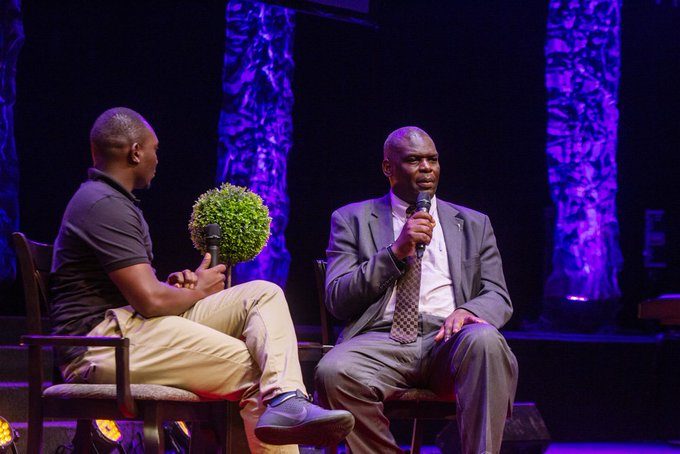
Photo: Courtesy.
This week President Museveni appointed the Director of Public Prosecutions Mike Chibita as a Supreme Court Judge.
This development comes just over two months since the 56-year-old was elected to the executive committee of the International Association of Prosecutors (IAP).
The organisation brings together prosecutors from all over the world, boasting of a diverse membership from more than 177 countries and representation from across the world.
Today, Uganda Christian News sheds a light on Justice Chibita’s Christian faith.
He once served as the president of Scripture Union and president of Uganda Christian lawyers’ fellowship.
Not so long ago, Chibita was hosted by Watoto Church during the famous ‘Power, Sex and Money’ weekly gathering.
Here are the major highlights from his speech:
As a Christian, how have you been able to execute criminal Justice?
Chibita: There was a judge of the US Supreme Court called Antonin Scalia. He was a very well known devout Catholic, and he was known to be a man of faith on the Supreme Court of the US. I had the privilege to meet him, and we put that question to him as a judge of the Supreme Court: ‘How do you handle matters?’ And he said, ‘our Lord Jesus Christ told us to treat everybody equally and fairly and justly’. So, being a Christian and a lawyer, I see no contradiction. It is the ultimate. In fact, it is the epitome of Christianity, to be a lawyer and to do things fairly.
The Bible says, ‘act justly and compassionately and with mercy.’ And so, using my discretion as a judicial officer, and somebody who has been clothed with immense responsibility, I find it so much in sync with the gospel of Jesus Christ to do justice to all people and that is what I do.
I ensure that I represent my Lord Jesus Christ in the decisions I make.
How are you able to balance family and work?
Chibita: The Job is very demanding. And I think that is an understatement on time, but I know I’m a human being, I have limited capacity. So, there are some things I have ring-fenced for my family. And one of them is breakfast.
We wake up very early, and many of the children are going away from home. But, I ensure that I have breakfast with my wife and we talk through our day’s program and all. She also works. So, we kind of go our separate ways, but at least we’ve spent some time together. And then, we have these phones with so much social media, so, at least once a day, I send her a message.
Thankfully courts don’t work on weekends. So, almost anything can wait until Monday. Weekends, we try to safe guard it as family time.
What’s your sentiment towards the growing rates of violence against women and children?
Chibita: We deal with five Capital Offences in our work. By this, I mean, if you commit an offense in that category, you could be sentenced to death. I realized that these five offenses are a result of people mishandling money, sex and power.
Treason is about trying to overthrow a government, and all that is about power not being handled properly.
Then we have rape, which is a capital offense – and aggravated defilement that is about mishandling your sexuality. That means you have not put sex in a proper perspective, you have not understood it.
Then, we have murder and aggravated robbery, which are also capital offenses. Aggravated robbery is about trying to get what you did not work for. That means you are putting money out of perspective.
The issue of sexual and gender based violence is because people have failed to put sexuality in a proper perspective. The value system we ascribe to says, ‘sex should be looked at and practiced in the context of marriage.’ Once you try to go outside that definition, that value system, you are bound to step on a slippery slope, which could lead you in very, very serious trouble.
Do you think certain crimes call for forgiveness as a prosecutor?
Chibita: As a prosecutor, my job is not to forgive. I think forgiveness is for God, and while I’m outside office. But once I sit in the chair, I take off the heart of forgiveness, and I put on the one of prosecution, to prosecute each and every single offense.
What is your view on death penalty?
Chibita: Part of the job we do, and as a judge, is you subordinate your personal feelings to the law. We always swear to uphold the constitution. Our law has the death penalty on it. And therefore, regardless of my personal feelings, I am in this office to uphold the law.
I can tell you that as a judge, I sentenced five people today. I can also tell you that when I was a state attorney in the Attorney General’s chambers, the people on death row then, a famous case called Susan Kigula, I was the lead counsel, asking the Constitutional Court to uphold the death penalty, because that was my job. I was convinced that majority of Ugandans, wanted the death penalty to stay. I was a public officer. My job was to do the will of the people of Ugandans. And, if I did not agree with that position, then I could leave the office.
What is your view on overstay in power?
Chibita: One thing I’ve learnt, and which God has been teaching me is that when you have power, it’s like driving a car with an accelerator which can go up to 200 kilometers per hour. The most important pedal in a powerful car is the brake pedal. I’ve realized that when you have a lot of power, the most important thing to exercise is restraint. Once you lose control of restraint, you are headed for trouble, because it is said, ‘absolute power corrupts absolutely.’
What are some of the giants you have faced?
Chibita: I faced many giants. I was number five in my family out of 11. I faced the giant of death. All my older siblings passed away, and I’m number one now, by default. So I’ve had to deal with grief and death over time. And that has been a difficult thing to deal with.
Then, at one point in 2017, my staff went on strike for two months. You cannot begin to imagine what that meant for me as an individual because the government was saying, “you are the leader of these people, how can they go on strike?” And my officers were saying, “you are the one who represents us in government, why can’t they increase our salary?” It was quite a challenging time.
Then, there are issues of corruption. And, you know, on this scale you’re talking about, especially people in high places, you have to take the decision to prosecute them. Just being in the Office of the Director is a very lonely place.
I think pastors can [relate with what I am saying]. You are in a place where you have to make decisions however, everybody wants you to take their side. You have to deal with that. You get attacked every day. In media, some people just don’t have the information. There is a lot of ignorance, masquerading as information. You have to deal with those giants.
But ultimately, a friend of mine told me that the people who don’t have challenges in this world are in a place called the cemetery. As long as you are not in a cemetery, you will have giants.
When prosecutors went on strike, what is it that kept you going and how were you able to bring them back?
Chibita: The thing about power, you need to know that you cannot solve all the problems in the world. You have to know your capacity.
My important role was to be a mediator between these two parties, and I had to be impartial.
There is a time to choose battles, but there are times when the battles choose you. This particular one just chose me. I could have done without choosing it, but the strike up in and I was right there in the middle, and I had to deal with it. One of the things that you have to learn to do in my position and as a leader is to tell people the truth. The truth is not always pleasant.
Once the prosecutors realized I was telling them the truth, I mean, I told them if I had the money and it was up to me, I would increase your salaries yesterday, but government also is not a shop. They cannot abruptly say we have increased your salary. It is a process.
Then, I also had to tell government that, “you know, you cannot employ people for a long time and give them a lot of work and not think about their terms and conditions of service.” So, both sides knew that I was presenting the position as it was, as best as I could.
Do you think because people are not well remunerated that is a perfect excuse for them to be corrupt?
Chibita: There can never be an excuse for you to be corrupt. The average person thinks that if you have not paid me well, I have to look for a way of paying myself. But if you are grounded in a value system, which abhors and sees corruption as vice, that would not be the way to look at it.
How do you deal with criminal cases involving political heavyweights?
Chibita: I handle my job, and everybody the same, without fear or favor, ill will or affection. That is the guiding principle.
Do you think your job description is in conflict with biblical principles (upholding the law above what the Bible teaches, for-example in case of death sentencing)?
Chibita: There are two answers to that. There is a legal answer, to which I say, I’ve never killed anybody. My job is to sentence to death. ‘Sentence to death’ and ‘murder’ are two different things.
But the more theological and appropriate maybe, is that you cannot read the Bible in isolation. You have to read the Bible in totality. You cannot take out one verse, because elsewhere The Bible says give to Caesar what is Caesar’s. And so, our Caesar here demands that if you commit capital offenses, we sentence you to death. So, even if I was the hangman, who actually puts the people to sleep, I still would not see any conflict with my Christian duty because of the law of the land (and each land has its own laws).
The book of Isaiah 33:22, says, ‘for the Lord is our judge, the Lord is our lawgiver, the Lord is our king’. This scripture is talking about rule of law, because it has the three arms of government. It is ordained in the Old Testament, meaning, we are practicing the law as it is prescribed even in Scripture. For the legislature, its job is to give laws, and one of the laws they have given us is if you commit one of the five Capital Offenses, you can be sentenced to death. There is no conflict at all with my Christianity.
How can all of us be a part of the justice system?
Chibita: First and foremost, the best thing you can do for the criminal justice system is not to be one of the criminals. Secondly, when you see an offense happening, please report to the nearest authorities.
You also have to be very careful. Some of the criminals are very dangerous, so you don’t want them to Know that you are the one who reported them, I have to caution you about that, that as you go about it, you also have to be discreet. You have to know who you are handing the information to and that kind of thing.

